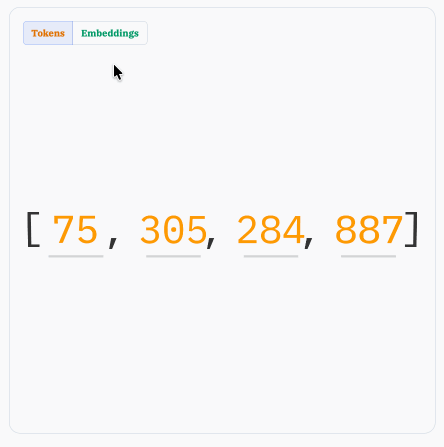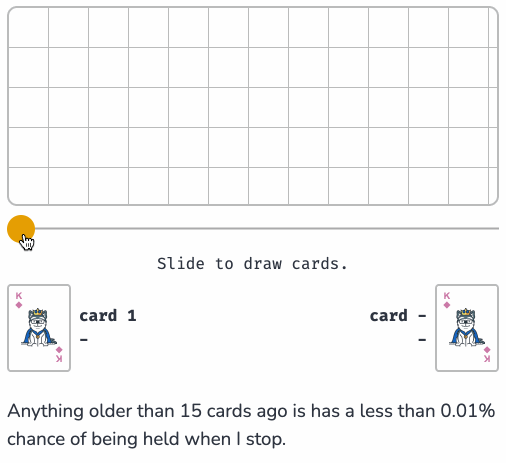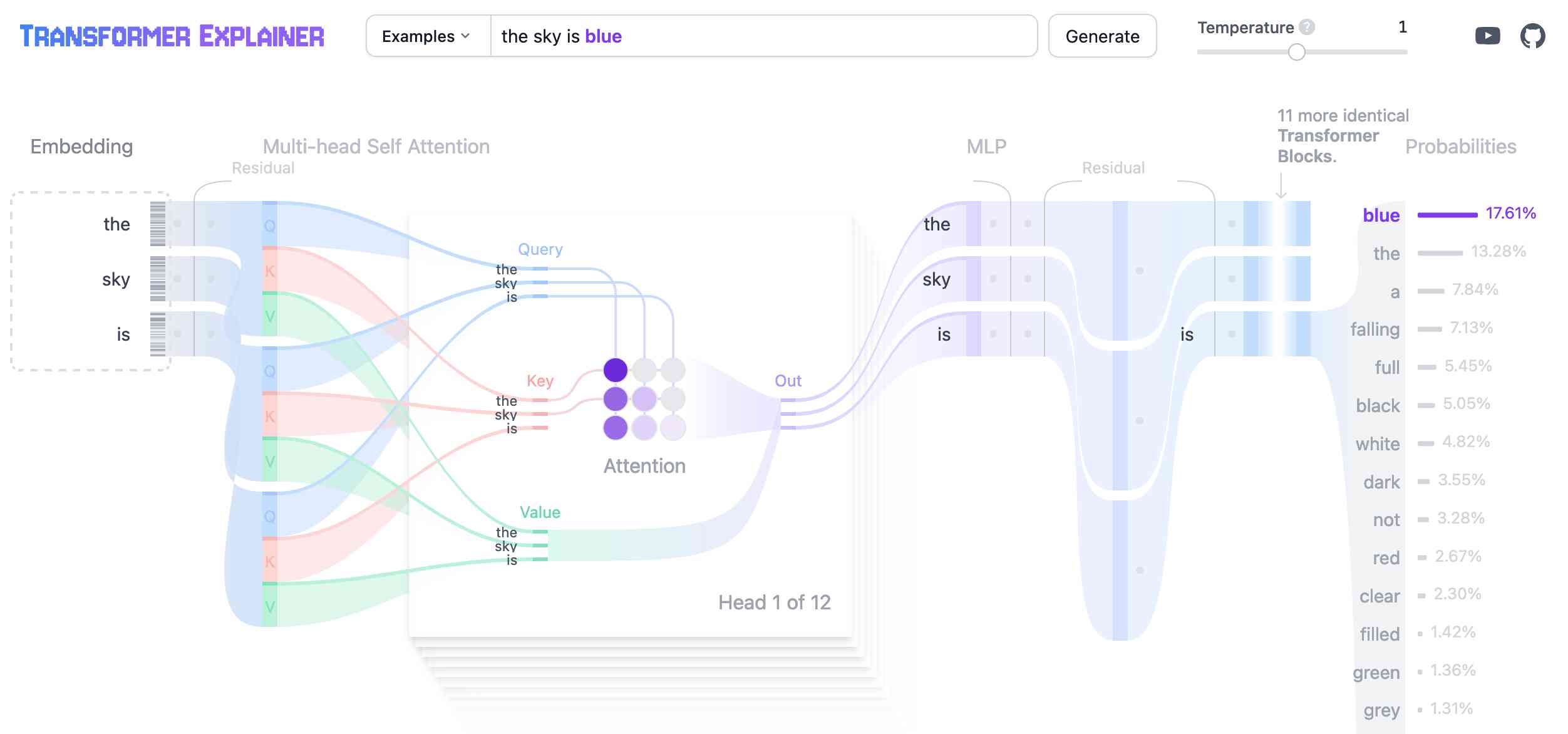27 posts tagged “explorables”
2025
Sam Rose explains how LLMs work with a visual essay. Sam Rose is one of my favorite authors of explorable interactive explanations - here's his previous collection.
Sam joined ngrok in September as a developer educator. Here's his first big visual explainer for them, ostensibly about how prompt caching works but it quickly expands to cover tokenization, embeddings, and the basics of the transformer architecture.
The result is one of the clearest and most accessible introductions to LLM internals I've seen anywhere.

A Friendly Introduction to SVG (via) This SVG tutorial by Josh Comeau is fantastic. It's filled with neat interactive illustrations - with a pleasing subtly "click" audio effect as you adjust their sliders - and provides a useful introduction to a bunch of well chosen SVG fundamentals.
I finally understand what all four numbers in the viewport="..." attribute are for!
Reservoir Sampling (via) Yet another outstanding interactive essay by Sam Rose (previously), this time explaining how reservoir sampling can be used to select a "fair" random sample when you don't know how many options there are and don't want to accumulate them before making a selection.
Reservoir sampling is one of my favourite algorithms, and I've been wanting to write about it for years now. It allows you to solve a problem that at first seems impossible, in a way that is both elegant and efficient.
I appreciate that Sam starts the article with "No math notation, I promise." Lots of delightful widgets to interact with here, all of which help build an intuitive understanding of the underlying algorithm.

Sam shows how this algorithm can be applied to the real-world problem of sampling log files when incoming logs threaten to overwhelm a log aggregator.
The dog illustration is commissioned art and the MIT-licensed code is available on GitHub.
2024
Transformer Explainer. This is a very neat interactive visualization (with accompanying essay and video - scroll down for those) that explains the Transformer architecture for LLMs, using a GPT-2 model running directly in the browser using the ONNX runtime and Andrej Karpathy's nanoGPT project.

Load Balancing. Sam Rose built this interactive essay explaining how different load balancing strategies work. It's part of a series that includes memory allocation, bloom filters and more.
An animated introduction to Fourier Series (via) Outstanding essay and collection of animated explanations (created using p5.js) by Andrei Ciobanu explaining Fourier transforms, starting with circles, pi, radians and building up from there.
I found Fourier stuff only really clicked for me when it was accompanied by clear animated visuals, and these are a beautiful example of those done really well.
CRDT: Text Buffer (via) Delightfully short and clear explanation of the CRDT approach to collaborative text editing by Evan Wallace (of Figma and esbuild fame), including a neat interactive demonstration of how the algorithm works even when the network connection between peers is temporarily paused.
Bloom Filters, explained by Sam Rose. Beautifully designed explanation of bloom filters, complete with interactive demos that illustrate exactly how they work.
Okay, Color Spaces (via) Fantastic interactive explanation of how color spaces work by Eric Portis.
2023
LLM Visualization. Brendan Bycroft’s beautifully crafted interactive explanation of the transformers architecture—that universal but confusing model diagram, only here you can step through and see a representation of the flurry of matrix algebra that occurs every time you get a Large Language Model to generate the next token.
An Interactive Intro to CRDTs (via) Superb interactive essay by Jake Lazaroff, providing a very clear explanation of how the fundamental mechanisms behind CRDTs (Conflict-free Replicated Data Types) work. The interactive explanatory demos are very neatly designed and a lot of fun to play with.
See this page fetch itself, byte by byte, over TLS (via) George MacKerron built a TLS 1.3 library in TypeScript and used it to construct this amazing educational demo, which performs a full HTTPS request for its own source code over a WebSocket and displays an annotated byte-by-byte representation of the entire exchange. This is the most useful illustration of how HTTPS actually works that I’ve ever seen.
Language models can explain neurons in language models (via) Fascinating interactive paper by OpenAI, describing how they used GPT-4 to analyze the concepts tracked by individual neurons in their much older GPT-2 model. “We generated cluster labels by embedding each neuron explanation using the OpenAI Embeddings API, then clustering them and asking GPT-4 to label each cluster.”
2022
Draw SVG rope using JavaScript (via) Delightful interactive tutorial by Stanko Tadić showing how to render an illustration of a rope using SVG, starting with a path. The way the tutorial is presented is outstanding.
Sha256 Algorithm Explained (via) Absolutely beautiful interactive animated explanation by Domingo Martin of the SHA256 hashing algorithm.
2020
Cameras and Lenses (via) Fabulous explotable interactive essay by Bartosz Ciechanowski explaining how cameras and lenses work.
A visual introduction to machine learning. Beautiful interactive essay explaining how a decision tree machine learning module is constructed, and using that to illustrate the concept of overfitting. This is one of the best explanations of machine learning fundamentals I’ve seen anywhere.
2019
An Interactive Introduction to Fourier Transforms (via) I love interactive exploitable explanations and this is the best I’ve seen in a while: Jez Swanson breaks down exactly what a Fourier transform does, first by letting you interactively draw and deconstruct wave patterns and then by showing Epicycles andcexplsining JPEG compression. All with not a formula in sight!
2018
Notebook: How to build a Teachable Machine with TensorFlow.js (via) This is a really cool Observable notebook. It explains how to build image classification that runs in the browser on top of Tensorflow.js, and includes interactive demos that hook into your webcam and let you hold up items and use them to train a classifier. Since it’s built on Observable every single underlying line of source code is available to browse as part of the essay.
What do you mean “average”? (via) Lovely example of an interactive explorable demonstrating mode/mean/median, built as an Observable notebook using D3.
USGS World Earthquake Map (observable notebook). Here’s an extended version of the notebook constructed by Jeremy Ashkenas in that Observable YouTube demo. You really need to check this thing out—the notebook itself has sliders in that you can manipulate (even on a mobile browser) or you can click to edit the code and see your changes reflected in real-time. If you sign in with GitHub you can fork the project to your own account and save your changes.
Observable: An Earthquake Globe in Ten Minutes. Well worth your time. Jeremy Ashkenas uses Observable to live-code an interactive visualization of recent earthquakes around the world, using USGS data (fetched as JSON), d3, topoJSON and an Observable notebook. I’m sold—this is truly ground-breaking new technology.
2017
JOY.js (via) Delightful new exploratory programming environment from Nicky Case. Try the Turtle demo, which takes Logo and updates it for the modern web.
Pink Trombone (via) Explorable explanation of the human vocal system by Neil Thapen. View source for some pleasantly readable JavaScript / canvas / window.AudioContext code.
Feature Visualization (via) Another gorgeous paper published on Distill, the journal that prides itself on including interactive visualizations to help provide clear explanations of machine learning.
An interactive explanation of quadtrees (via) Neat explorable explanation of quadtrees, using interactives built on top of D3.
Explorable Explanations. I’m fascinated by web articles and essays that embed interactive visualizations—taking advantage of the unique capabilities of the medium to help explain complex concepts. Explorable Explanations collects exactly these, under the banner of “learning through play”. They also gather tools and tutorials to help build more of them.